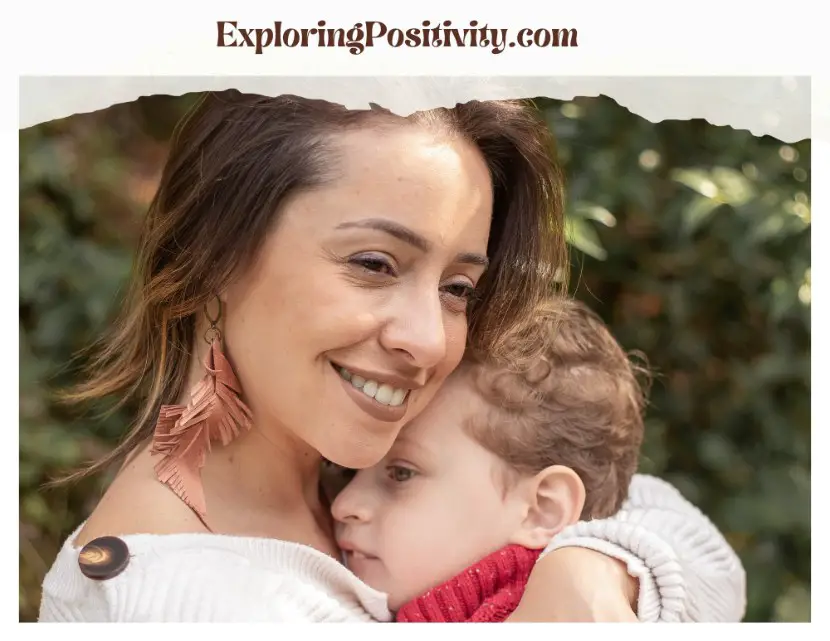Do you worry that you may be too close to your son? Does your relationship with him feel suffocating at times? Are you experiencing mother-son enmeshment? If you find yourself in any of these situations, rest assured.
I’m here to guide you in managing unhealthy relationships through effective strategies in this blog “Mother Son Enmeshment Checklist”.
Enmeshment between a mother and son is characterized by an extreme emotional closeness that prevents the son from developing a sense of self outside the relationship. It’s an unhealthy dynamic that robs both mother and child of independence and privacy.
Enmeshment can profoundly damage the mother and child’s self-esteem and emotional health. Sons feel incapable of autonomous thought or action, perpetually seeking mum’s validation. This cripples confidence and independent growth.
Meanwhile, mothers stake their entire self-worth on the relationship, struggling with feelings of emptiness or worthlessness when alone.
Both become emotionally stunted, relating to others through unhealthy attachment rather than true intimacy. They’re isolated from developing broader support systems.
The constant anxiety over separation and meeting the other’s needs is exhausting, leading to chronic stress, depression, and relationship codependency issues. Ultimately, enmeshment deeply erodes individual identity and independence.
In this article, (Mother Son Enmeshment Checklist) we’ll explore the signs of enmeshment and its causes and provide a checklist to help you identify areas for improvement.
You’ll also learn practical tips to overcome enmeshment, restore healthy boundaries, and allow your son to individuate while maintaining a close mother-son bond.
What is Mother-Son Enmeshment?
Mother-son enmeshment is an extreme form of closeness between a mother and son that forms an emotional dependency, hampering the son’s identity development. It goes beyond regular motherly affection into an invasive, controlling bond rooted in the mother’s insecurities.
In an enmeshed relationship, the mother treats the son more like a partner than a child. The son becomes the mother’s emotional confidante and primary source of intimacy and support. This prevents him from forming an autonomous sense of self.
The son struggles to set healthy boundaries or individuate, overly concerned with meeting his mother’s needs and avoiding conflict. He feels responsible for her emotional well-being and happiness.
Meanwhile, the mother feels she can’t cope without her son’s constant presence and reassurance. She struggles when he pulls away or seeks independence. Her sense of self is contingent on being needed by her son.
This unhealthy attachment breeds guilt, anxiety, and depression and delays emotional maturation in the son. He misses vital developmental milestones and may struggle to form healthy romantic relationships later.
Enmeshment isn’t the same as regular motherly closeness. It specifically refers to a distinct lack of boundaries that impedes the son’s independence.
Let’s explore some common signs of an enmeshed mother-son relationship:

Signs of Unhealthy Enmeshment Between a Mother and Son
Here are some behaviors that may indicate an enmeshed mother-son relationship:
1. The son struggles to differentiate or individuate
Sons in enmeshed relationships have difficulty separating their thoughts, feelings, and needs from their mothers. They lack a solid sense of self outside the relationship.
The son prioritizes his mother’s needs and emotions above his own. He struggles to make autonomous choices without her input and approval. Major life decisions become mired in guilt over upsetting his mother or not meeting her expectations.
2. The mother treats the son like an emotional confidante
The mother discloses too much personal information to the son beyond his emotional maturity level. She vents her frustrations, shares intimate details about her marriage or romantic relationships, or cries on his shoulder.
The son becomes the mother’s therapist, emotionally supporting and reassuring her. This forces him into a parental role and prevents him from seeking support.
3. The mother discourages outside relationships
An enmeshed mother may react strongly to her son’s budding friendships, romantic relationships, or outside activities. She guilt trips him for spending time away from her or makes him feel anxious and torn about leaving.
4. The son struggles with separation anxiety
When pulled away from their mothers, sons in enmeshed relationships often experience extreme separation anxiety. The mother may also have separation anxiety and struggle to be apart.
Minor separations like a school field trip or sleepover trigger disproportionate anxiety in the son. He worries excessively about his mother’s well-being in his absence.
5. Poor personal boundaries exist
The mother and son have little sense of privacy, respecting each other’s physical space and alone time. For example, the mother may enter her teen son’s room without deeply knocking or probing into his matters.
6. The mother disapproves of the son’s growing independence
An enmeshed mother resents and sabotages her son’s efforts to be more independent. She guilt trips him for branching out socially or trying new activities without her. Or she intervenes excessively in the name of protection, like monitoring his homework too closely for his age.
7. The son feels responsible for his mother’s happiness
The son must keep his mother happy by limiting anything that upsets her. He feels guilty or ashamed about his needs or opinions if they conflict with hers. This makes it hard for him to develop his interests and views.
8. Their relationship lacks generationally appropriate roles
The mother excessively confides in or depends on the son to fill her emotional needs. She treats him like a surrogate spouse rather than taking age-appropriate caregiving roles. Meanwhile, the son misses out on being a son and receiving parental guidance.
9. The mother competes with her son’s romantic partners
An enmeshed mother may feel jealous or threatened by her son’s girlfriends. She guilt trips him for spending less time with her or makes snide remarks about his partners. She struggles to let her son go and resents losing emotional intimacy to another woman.
10. Others express concern
Friends, relatives, teachers, or the son’s partner may have commented on their uncomfortably close relationship. But the mother brushes this off as normal motherly affection. Look out for outside observations that the dynamic seems excessive.
Only some of these signs must be present to indicate an enmeshed relationship. But the more that apply, the more likely your bond with your son has become unhealthy and restrictive.
Next, we will explore what causes this excessive attachment to form.
What Causes Mother-Son Enmeshment?
Several factors can drive unhealthy enmeshment between a mother and son:
1. The mother’s unmet emotional and mental health issues
Mothers struggling with anxiety, depression, or personality disorders may depend more heavily on sons for regulation and support. Their emotional skills may be stunted, leading them to use the son to soothe abandonment fears or inner turmoil.
These mums must help rebuild coping mechanisms beyond clinging to sons before enmeshment forms.
Enmeshed mothers often have unresolved emotional needs from past trauma or losses. Lacking a solid support system, she turns to her son to have her emotional needs met.
This could stem from grief, a painful divorce, abusive relationships, loneliness, or mental health issues.
2. Insecurity and separation anxiety
The mother may grapple with attachment anxiety or abandonment issues. She feels insecure and unmoored without a constant connection to her son. Past instability or losses can create a terror of further abandonment.
3. Living vicariously
Some enmeshed mothers hope to resolve their unfulfilled dreams through their sons. They pressure sons to excel at academics, sports, or arts they wish they had succeeded. This creates excessive focus on the son’s achievements for the mother’s validation.
4. Sons raised without fathers
Sons raised only by mothers are at higher risk of enmeshment. Without a father’s influence, sons can feel obligated to take on emotional support roles for the mother.
A lack of balanced parenting makes it harder for mothers to avoid enmeshment. Fathers provide essential modeling of autonomy, boundary setting, and channeling mothers’ projections about men. Their involvement allows sons space to be children.
5. Personality disorders
Certain cluster B personality disorders like narcissistic or borderline PD can drive maternal enmeshment. The mother lacks empathy and views the son as an extension of herself to be controlled.
6. Cultural gender norms
Some cultures perpetuate the image of mothers as singularly focused on children above all else. Mothers are expected to be wholly dedicated to their sons’ well-being, even at the cost of personal independence. Mums who overly absorb this notion can override their need to be constantly attentive.
Meeting unrealistic maternal standards can morph into emotionally smothering sons without other outlets. This can enable excessive enmeshment, which profoundly affects the son’s development.
7. Guilt about working
Working mothers may overcompensate by smothering sons with constant attention on nights and weekends. Guilt over being away all day can drive efforts to maximize time together when home.
8. Lack of community support
Single mothers needing family nearby or friend support may lean too heavily on sons for companionship. A mother’s loneliness and isolation can drive excessive emotional entanglement without outlets to meet her adult needs.
Sons become parentified as she clings to them for social connection. Building community through finding other mum friends, playgroups, or support networks can help prevent sons from becoming surrogate partners.
9. Overprotective parenting
Mothers who adopt a highly anxious, risk-averse parenting style can slip into enmeshment. To keep their child safe, they tightly control their experiences and inadvertently prevent everyday independence.
This crowding leaves little room for the child to develop self-direction. The son never learns to assess risk vs reward, make mistakes, or self-soothe, fostering an unhealthy dependent attachment.
10. Lack of childcare support
Mothers can burn out in families where fathers need to share sufficient parenting duties, or childcare help is unaffordable.
Exhausted from sole caretaking without breaks, it becomes hard not to depend too much on older kids. Affordable childcare access could allow mothers time for self-care and balance, preventing sons from becoming default caregivers.
Of course, mild and temporary enmeshment is normal after significant life changes. For instance, a nasty divorce may warrant extra mother-son closeness as they adjust.
However, it becomes unhealthy when the excessive proximity persists, preventing the son from developing autonomy as he matures.
The Far-Reaching Impacts of Mother-Son Enmeshment
Enmeshment between a mother and son has profoundly detrimental effects on both parties if left unresolved.
The extreme emotional and psychological interdependence robs the mother and child of the ability to develop and function in healthy, independent ways. Let’s discuss its impacts on both in detail:
Impacts on the Son’s Development
Sons struggle to individuate and mature emotionally, while mothers become consumed by codependency, control issues, and a loss of self outside the relationship.
Enmeshment distorts the parental bond into one of desperate clinging rather than secure nurturing. A few impacts on the son’s development are the following:
a. Lack of Autonomy
Sons in enmeshed relationships need to develop a sense of autonomy and independence. They rely excessively on their mother’s direction and input to make decisions.
Simple choices become filled with self-doubt and uncertainty without their mother’s validation. This impedes their ability to trust their judgment and self-direct their lives. It leaves them ill-prepared to function independently as adults in careers, finances, and responsibilities.
b. Weak Sense of Self
Enmeshment severely hampers a son’s ability to cultivate his unique identity. His sense of self is stifled by the need to limit thoughts, interests, or preferences that contradict his mother’s. With no separation, he merely acts as an extension of her rather than accessing his true self.
The constant pressure to meet her needs leaves little emotional space for introspection. Sons feel empty, confused, or lost when considering their desires and life path separate from their mother.
c. Poor Emotional Skills
Sons in enmeshed relationships need more opportunities to properly develop emotional intelligence and self-regulation skills. Their mothers dictate how emotions should be expressed, leaving sons unable to identify their feelings, needs, or appropriate coping mechanisms.
They mature emotionally, overly relying on others to soothe or validate them. Basic skills like self-motivation, confidence, and managing life’s ups and downs fail to form. This leaves them unequipped to handle emotional life challenges.
d. Immature Relationships
Having been parentified as children, sons struggle to form mature romantic relationships later in life.
They revert to caretaking roles, attract needy partners, and fail to set healthy boundaries. Never having experienced proper emotional intimacy outside an enmeshed relationship, sons need more understanding of mutual support vs dependence.
Their overbearing mothers also sabotage budding relationships that threaten the enmeshment. Without interventions, the cycle continues.
e. Mental Health Decline
The chronic stress, identity confusion, lack of autonomy, and insecure attachment inherent in enmeshment take a toll on sons’ mental health.
Anxiety, depression, poor self-esteem, and emotional volatility often emerge over time. Substance abuse can become an unhealthy coping mechanism. Counseling and separation from the enmeshment are needed to restore stability.
Impacts on the Mother
Enmeshed relationships do not only impact a single individual but also have a mutual influence. As we discuss the effect of enmeshment on a son, it is the turn to delve into its impact on the mother.
a. Codependency
Mothers in enmeshed relationships often struggle with debilitating codependency, wherein their entire identity and self-esteem hinge on their relationship with their son.
They cannot self-validate, self-direct, and self-soothe—everything they do centers around eliciting their son’s attention and affirmation. When alone, they feel empty and worthless without their attachment figure. This leaves mothers unable to form a solid sense of self.
b. Control and Authority Issues
Enmeshed mothers rely on exerting excessive control over their sons’ lives to maintain the enmeshment that validates them. This need for domination stems from a sense of powerlessness.
Mothers micromanage and infantilize their sons to avoid feeling vulnerable or abandoned. But this unjustly damages sons’ independence and breeds resentment. Balancing authority with autonomy is crucial.
c. Loss of Identity
Mothers in enmeshment often betray their interests, goals, and relationships to avoid conflict with their sons. Their fear of separation leads them to absorb their child’s preferences and limit their growth.
Mothers need to pursue work, hobbies, or social ties separate from the relationship to maintain an understanding of their passions, values, and dreams. Their singular focus on their son consumes their identity.
d. Emotional Immaturity
Relying constantly on one’s child for validation stunts mothers’ emotional maturity. Their sons become pseudo-partners as enmeshment intensifies, leaving no room for maternal self-development.
Mothers fail to develop healthy self-esteem, coping skills, boundaries, or independent interests. This arrested growth often originates from unresolved attachment traumas or grief that sons are forced to resolve.
Ultimately, both parties suffer greatly in enmeshed relationships unless meaningful steps are taken toward autonomy, individuation, and restoring generationally appropriate roles. Psychological help guides families in rebuilding identities separate from one another.
Come on explore some tips to restore healthy boundaries between a mother and son.

How to Overcome Unhealthy Mother-Son Enmeshment
Here are some steps mothers and sons can take to overcome enmeshment and improve their relationship:
1. Increase mother’s independent pursuits
The mother must develop interests, social outlets, and responsibilities apart from her son. This reduces pressure on the son to meet her emotional needs.
She could take a class, join a club, volunteer, work part-time, or increase her time with friends. Building her support system makes her less dependent on her son for comfort.
2. Encourage the son’s autonomy
The mother should encourage her son’s independence in age-appropriate ways. Support his desire for alone time, social activities, and exploring personal interests.
Start small – let him pick his clothes or walk to school solo. Then, work up to longer outings with friends or choose an extracurricular activity.
3. Set physical boundaries
Respect each other’s private spaces and alone time. Mothers should give sons privacy in their rooms, knocking before entering once they’re 8+. Limit excessive physical contact or sharing beds once boys hit puberty.
4. Limit emotional enmeshment
Avoid venting, probing too deeply into his life, or excessive worry over his regular growing pains. Share your struggles in small doses.
Sons should not have to act as the mother’s therapist. Set boundaries around emotional dumping and make time to build the son’s autonomy.
5. Attend family therapy
See a therapist who specializes in enmeshment and boundary issues. They can provide exercises and advice to improve communication, rebuild trust, and take age-appropriate roles.
6. Join a support group
Find an enmeshment support group for mothers or parents. This provides solidarity and advice from others overcoming unhealthy attachment to their children.
7. Practice small separations
Gradually increase time spent apart to reduce separation anxiety. Start with parents’ date nights or sleepovers at a relative’s house.
Work up to solo day outings for the son to build self-care skills. Urge school trips or summer camps to improve self-sufficiency.
8. Discuss enmeshment openly
Talk honestly about how your relationship has become unhealthy and your mutual desire to improve it. Acknowledge the son’s need to individuate without guilt.
Agree to tackle this compassionately as a team. Maintain open communication and reassess progress.
9. Set firm relational boundaries
Discuss what behaviors should change to allow the son more autonomy. For instance, limiting venting, controlling criticism, guilt trips, intrusion into his space, and attempts to restrict his external experiences.
Model respecting other’s boundaries to him as well. Check in often to ensure improvements stick.
10. Seek individual therapy
The mother can address her issues driving enmeshment through therapy. She can work through grief, trauma, abandonment wounds, or self-esteem issues perpetuating the unhealthy attachment.
11. Schedule regular check-ins
Set times each week to talk openly without judgment about your evolving relationship. Discuss what behaviors and boundaries are helping vs hurting. Brainstorm any issues arising.
Example dialogue:
Mom: “I want us to check in on Sundays about how this week went in terms of respecting each other’s space. What’s working so far in balancing closeness versus independence?”
Son: “I liked when you let me go to Jake’s by myself. But I felt smothered when you called 3 times to check if I was ok. Maybe we can agree on a check-in call limit?”
12. Attend family workshops
Look for family or parent workshops on setting boundaries, rebuilding trust, and improving communication. These provide structured guidance in a group environment.
13. Read books on enmeshment
Exploring books together on differentiating ourselves from others’ emotions helps shift mindsets. Some quality options are:
- Where to Draw the Line by Anne Katherine
- Boundaries by Henry Cloud and John Townsend
- Facing Codependence by Pia Mellody
14. Develop your support systems
To avoid over-relying on your son, actively cultivate your friends and interests. Join parenting groups to find solidarity and advice.
15. Practice mindfulness
Mindfulness meditation helps us observe our emotions without attaching or reacting to them. This allows more rational responses vs. unconscious enmeshment urges. Guided meditations are available on YouTube.
Unhealthy enmeshment can be dismantled over time by continuing to educate yourselves, shift perspective, and build emotional outlets.
How to Seek Professional Help for Enmeshment
Don’t be discouraged if you don’t notice any significant improvement through casual therapy. There are many professional support systems available. By joining them, you can work on alleviating your enmeshment issues. If you want to explore how they operate and what specific benefits you can expect to achieve. Let’s see:
a. When to Seek Professional Help
If you’ve noticed multiple signs of unhealthy enmeshment, seeking professional support is essential. A skilled therapist can provide tools to overcome engrained relationship patterns, rebuild trust, and restore balance.
Seeking counseling is especially crucial if enmeshment significantly impacts the son’s emotional development, school performance, and social life or causes depression or anxiety. The sooner unhealthy dynamics are addressed, the less damage is done long-term.
b. What to Expect in Therapy
Joint therapy sessions allow the therapist to observe your interactions and provide feedback. Initial sessions often focus on identifying each person’s needs and goals for the relationship.
The therapist will then make recommendations to improve communication and set boundaries. For instance, they may limit venting or advise spending brief periods apart.
Expect to receive “homework” tasks to practice between appointments, like pursuing independent hobbies. With time, joint positions taper off into individual counseling as issues are resolved.
c. Therapy Techniques Used
Professionals draw on various techniques to reduce enmeshment, including:
Cognitive behavioral therapy helps identify and reframe negative thought patterns driving clinginess. Attachment-based family therapy strengthens trust and security between members.
Emotion regulation skills help identify and express feelings healthily. Assertiveness training builds confidence in defining needs and setting boundaries.
Empty chair exercises allow venting emotions at an “imaginary” other member. Parts work helps members differentiate their feelings vs. others. Process groups connect families struggling with similar issues.
d. Finding the Right Therapist
Seeking a therapist experienced specifically in enmeshment and family systems work is key. They understand the nuanced dynamics at play.
Get referrals from primary care doctors or local mental health associations—interview potential therapists about their approach and success in treating enmeshed families.
Ensure you and your son feel respected and heard by the therapist selected. Trust your gut – only some therapists are a good match, even if they are highly qualified. Be patient, finding the best fit.
With professional guidance and ongoing practice of healthy relating, enmeshment can be reduced. Therapy provides the tools to overcome unhealthy patterns passed down through generations.
Mother-Son Enmeshment Checklist
Use this checklist to reflect on your relationship with your son. Check any behaviors that apply to either of you:
- [ ] My son struggles to make decisions without my input
- [ ] I feel hurt or resentful when my son spends time apart from me
- [ ] I confide private details about my relationships or vent to my son
- [ ] My son seems to prioritize my needs and emotions over his own
- [ ] I discourage or react negatively to my son’s outside friendships and interests
- [ ] My son struggles with extreme guilt over upsetting me
- [ ] I compete with or resent my son’s romantic partners
- [ ] I struggle with separation anxiety when apart from my son
- [ ] I feel solely responsible for my mother’s emotional well-being and happiness
- [ ] My son and I have little sense of healthy physical boundaries
- [ ] I intervene excessively in my son’s life in the name of protection
- [ ] Others have commented on our relationship being too close
- [ ] I feel jealous and excluded when my son spends time with others
- [ ] My son feels he must regulate his emotions and filter his thoughts to avoid upsetting me
- [ ] I treat my son like a surrogate spouse rather than encouraging age-appropriate independence

Signs of Harmful Parenting
- [ ] My parent(s) frequently ignored or brushed aside my needs.
- [ ] I had many heated arguments with my parent(s).
- [ ] My parent(s) used hurtful insults against me.
- [ ] I felt pressured by unrealistic expectations my parent(s) set.
- [ ] My parent(s) often harshly criticized me.
- [ ] Sometimes, I daydreamed about running away or hiding from my parent(s).
- [ ] My family appeared more chaotic than other families.
- [ ] Leaving the house and getting away felt liberating.
- [ ] I felt my parent(s) invaded my privacy.
- [ ] I worried that I caused disappointment or sadness in my parent(s).
Signs a Parent Leaned on Me Too Much
- [ ] My parents often felt lonely, angry, or depressed.
- [ ] I felt more relied upon by my parent(s) than my siblings.
- [ ] My parents couldn’t agree on how to raise me and my siblings.
- [ ] I carried the burden of my parent’s happiness.
- [ ] My parent(s) relied on me for emotional support.
- [ ] My parent(s) struggled to maintain a stable group of friends.
- [ ] My parent(s) faced challenges with substance abuse.
- [ ] My parents frequently argued about their parenting styles.
- [ ] I put aside my needs to shield my parent(s).
- [ ] My parents had a history of separation, divorce, loss of a spouse, or constant conflict.
Signs of Unhealthy Emotional Bond
- [ ] My parent(s) treated me like their “best friend.”
- [ ] My parent(s) got overly involved in my activities.
- [ ] My parent(s) made inappropriate sexual comments or invaded my privacy.
- [ ] I felt closer to one parent than the other.
- [ ] I looked up to my parent(s) when I was growing up.
- [ ] My parent(s) inquired too much about my sexuality.
- [ ] I provided emotional support to my parent(s).
- [ ] My accomplishments made my parent(s proud.
- [ ] I received special treatment or gifts from my parent(s.
- [ ] My parent(s) often told me I was their favorite or most talented.
- [ ] My parents preferred my company to that of their spouse.
- [ ] I felt guilty spending time away from my parent(s).
- [ ] My parent(s) discouraged me from moving away in the future.
- [ ] My parent(s) shared personal information with me.
- [ ] My romantic partners never seemed good enough in the eyes of my parent(s).
The more checked boxes, the more likely your relationship has become unhealthily enmeshed. Use this awareness to seek professional help and establish firmer boundaries between mother and son.
You both deserve freedom, autonomy, and intimacy in your relationship. With self-work, honesty, and compassion, enmeshment can be overcome.
Last words On Mother Son Enmeshment Checklist
Unhealthy enmeshment between mother and son happens gradually over years of blurred relational boundaries and emotional dependence on one another. Restoring balance requires active work on differentiation and building autonomy.
But with therapy, open communication, and gradual steps like separate activities, enmeshment can be reversed. Mothers must fill their needs through their outlets rather than sons. Meanwhile, sons need support in individuating through developing interests, friendships, and self-care skills.
With time, both parties can retain affection while dismantling unhealthy attachment patterns. Sons can learn to self-regulate rather than solely focusing on mum’s needs. Mothers can guide while encouraging independence.
Mothers and sons can maintain a caring bond without sacrificing themselves by taking small steps to restore healthy boundaries and communication. With self-compassion and patience, overcoming enmeshment is possible.
The journey is well worth it to allow both mother and son to develop freely into the healthiest versions of themselves.
Some signs include the son struggling to individuate, the mother treating the son as a surrogate partner for emotional intimacy, poor boundaries, separation anxiety when apart, and the son feeling responsible for the mother’s happiness and well-being.
Enmeshment can begin in early childhood but often intensifies during adolescence as the son individuates naturally, and mothers struggle with this. The teen years are prime time for enmeshment to become entrenched.
Typically, active effort is necessary for the enmeshment to persist and likely worsen as the son reaches adulthood. Boundaries tend to degrade further over time rather than improve spontaneously.
Causes include:
- The mother’s unmet emotional needs.
- Insecurity.
- Separation anxiety.
- Lack of social support.
- Compensating for an absent dad.
- Living vicariously through the son.
- Mental health issues like depression.



